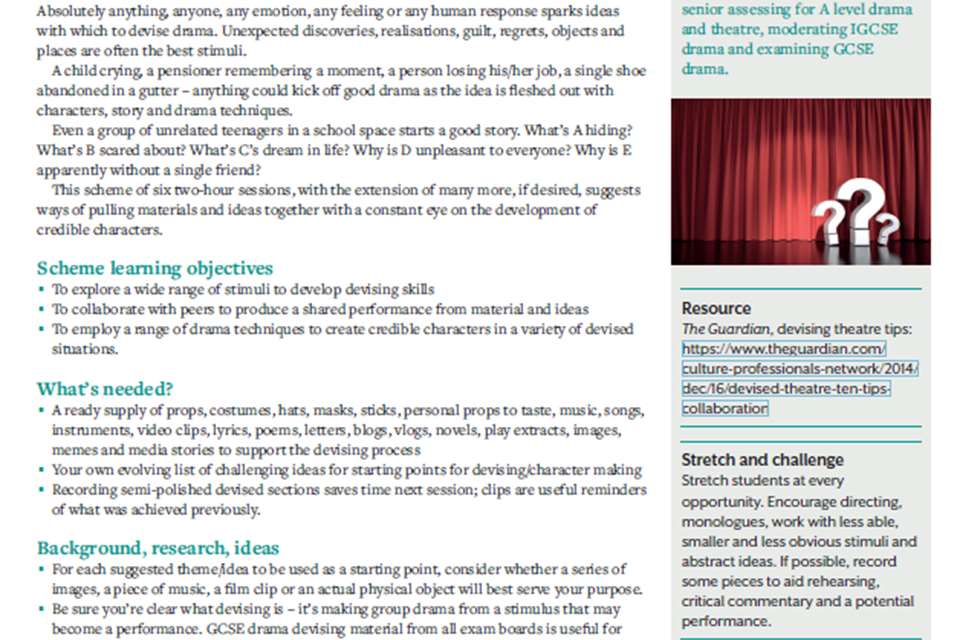Going Solo: National Youth Theatre's Acting for Video Games Masterclass
Josie Clark
Sunday, May 1, 2022
Teacher Josie Clark looks into the summer school training in acting for video games being offered by the National Youth Theatre.

Craig Fuller
The National Youth Theatre has become synonymous with creating ground-breaking opportunities for young people, and the latest addition to its vast array of masterclasses is no exception. Acting for Video Games offers participants (aged 18–28), the chance to engage in online sessions in virtual reality, animation and video game acting.
The NYT's head of Communications and Digital, Joe Duggan, reveals the company's rationale behind creating such an innovative experience: ‘At the National Youth Theatre, we always look to be responsive to both the industry and the young people we serve. As acting for video games and new immersive technologies like motion capture, VR and AR become part of the storytelling toolkit for creatives, we want to equip our young people to express themselves and tell great stories using these mediums.’
Digital elements
Since the pandemic, with theatres closing across the country, the arts has been forced to explore more creative ways of engaging young people and attracting new audiences, by embracing more advanced forms of technology. Duggan explains: ‘Digital was often thought of as an afterthought or an exhibition to go in a theatre's lobby, pre–pandemic, but after taking centre stage during the lockdown we think its value is being recognised. The access digital can provide to so many unable to engage with live work is huge.’ Within a prolonged period of isolation, technology became a lifeline for young people to connect with the world around them, and gaming was one of the key ways in which they were able to continue socially interacting with others.
With the UK gaming industry being the sixth biggest in the world and the significant rise of gaming courses at higher and postgraduate level, NYT have found a niche in the culture capital market with this new offering. Duggan stresses the importance of moving with the times in embracing career opportunities within new technologies, saying: ‘With the UK games industry booming and more and more green screen being used in filming, exposing young performers to these techniques at an early age gives them a head-start and prepares them to enter our evolving industry.’ Worth £65 billion worldwide, gaming is a lucrative career pathway and, fused with acting, could open up a feasible career pathway for those young actors who are equally passionate about the arts as they are about technology.
Appealing to new groups
This less conventional approach to acting is one that will appeal to a broad spectrum of young people, especially those individuals who would normally feel exposed within a live arts environment, as Duggan highlights: ‘We find some young people are most comfortable expressing themselves and their creativity through technology. We have seen participants who were too shy to speak in front of a group address a panel of industry professionals in a VR headset, so it's often liberating, both personally and creatively.’ Acting for Video Games brings together the creativity in building a character within a fictitious context with an additional layer of protection in communicating through this animated persona.
Expert training
Spearheaded by top industry professionals, the course will provide a whole host of technological skills for participants to harness, including voice-over, and facial and motion capture. Gaining an understanding of how to develop a character through voice will be a significant focus of the classes and will provide a creative vehicle to perform within an alternate reality. It is also designed to expose attendees to more advanced and unfamiliar technology where access is not determined by income, Duggan recognises that, ‘access to expensive new technologies can be a barrier, so we wanted to create courses where young people could access and have chance to play with tech that otherwise might be out of reach for them.’
Acting for Video Games is part of a diverse programme of NYT courses from five-day intensive masterclasses to long-term training programmes. The company are continuing to evolve in their use of technology within the arts and will soon release details on their Digital Storytelling course. The course will be of interest to anyone who is keen to explore how digital storytelling can be used as an integral part of theatrical storytelling. Updates will be announced on their website.
The Acting for Video Games course will run from 25 April to 25 May, is open to NYT and non-NYT members and has the option of two time slots at either 5pm or 7pm. The cost of the course is £75.00 and will consist of five online sessions. www.nyt.org.uk/courses




